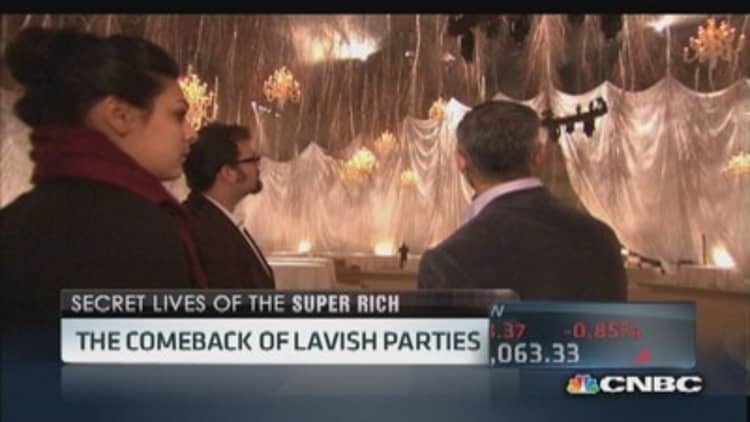The new wedding crasher isn't interested in the open bar and passed hors d'oeuvres at your cocktail hour. Or even the pile of envelopes on the gift table.
Amid rising hotel rates, crashers are after your discount.
"Anecdotally, it's becoming an increasing problem," said Bjorn Hanson, divisional dean and clinical professor for New York University's Preston Robert Tisch Center for Hospitality, Tourism and Sports Management.
Getting in on the lower price connected with a block of rooms for a wedding or a corporate event is becoming more appealing as hotels recover from recessionary lows.
(Read more: Most Outrageous Weddings)
The average U.S. daily room rate for 2013 is expected to reach $110.65, up 4.2 percent from last year, according to PKF Hospitality Research. And rates are steeper during high-demand times such as wedding season or a busy convention period, said Robert Mandelbaum, PDF's director of research information services.
At the same time, engaged couples are providing would-be crashers with more opportunities. Last year, 68 percent of couples had a wedding website, up from 60 percent in 2009, according to TheKnot.com.
Such sites usually include guest information, such as where to book rooms and deal codes that often are not password-protected, making crashing a block easy enough to do. A quick search for "wedding block," with a location and date, yields dozens of examples.
"It's difficult to prevent this sort of thing from happening if someone finds your hotel block information on your wedding website, since you want to make it as easy as possible for your guests to find the information they need," said Anja Winikka, site director for TheKnot.com.
(Read more: Eight ways to cut wedding costs without looking cheap)
Crashers often fly under the radar—unless couples have a reason to check block assignments, as I recently did.

Because we were concerned we weren't meeting the required minimum bookings at two of our blocked hotels, we called in early September to find out who had booked.
There was one unfamiliar name at the local Holiday Inn, where a Paul Marion had booked into the block using an online code, and another at the Hampton Inn & Suites, a Winferd Keaton. The hotel coordinator said that when pressed, Keaton claimed he was a guest of a guest of the groom—of course the bride didn't know him. (Attempts to reach Marion and Keaton for comment were unsuccessful.)
(Read more: Budget brides save by buying canceled weddings)
Hotels aren't overly concerned about crashers, as it's better to sell a room than have it go empty, even if someone has taken advantage of a discount he isn't entitled to, Mandelbaum said. That leaves it to the engaged couple to thwart interlopers.
Couples arranging a room block should check who has booked, particularly if the block is close to selling out, said Alan Fields, co-author of "Bridal Bargains." In that case, crashers could result in legitimate guests' paying higher rates or being unable to book at all. The uninvited can also pad the bill for things you might pay for per head for your guests, such as breakfast, shuttle use or gift placed in rooms.
You don't always need to take action on those you uncover, though.
"You could argue, if they're helping you fulfill a contractual requirement and you don't need those rooms, what's the harm?" Fields said.
And our crashers? When the hotels checked their stories, both canceled. Not that we missed them at the reception.
—By CNBC's Kelli B. Grant. Follow her on Twitter @kelligrant.


